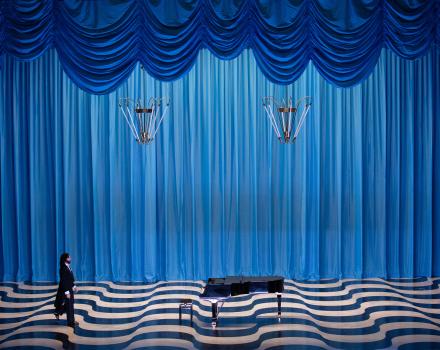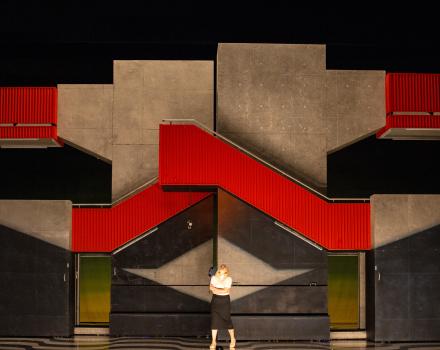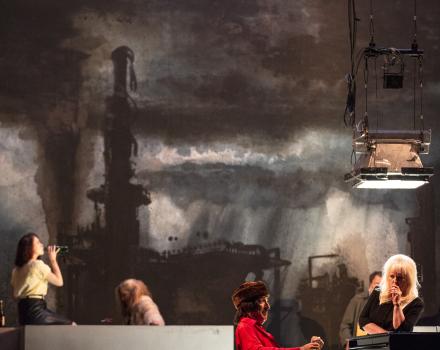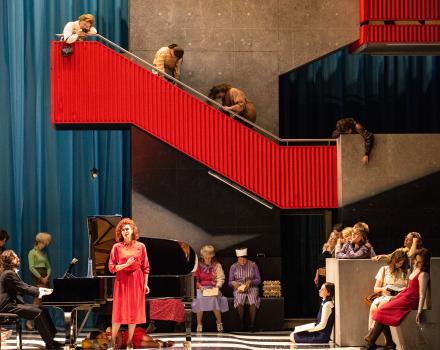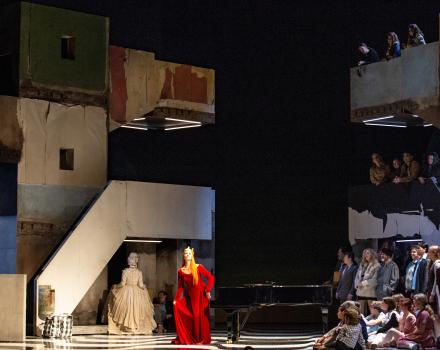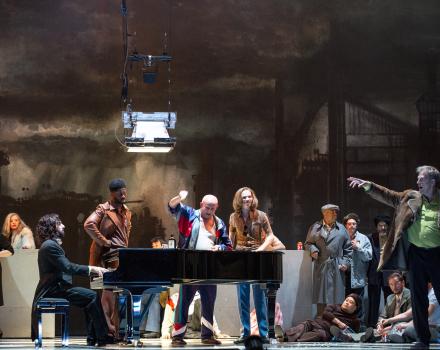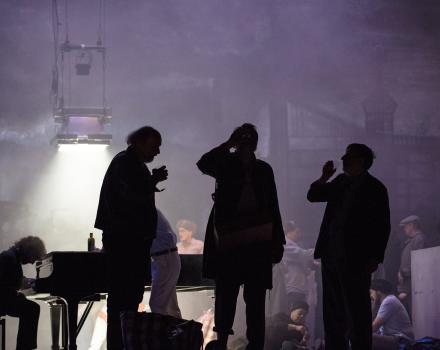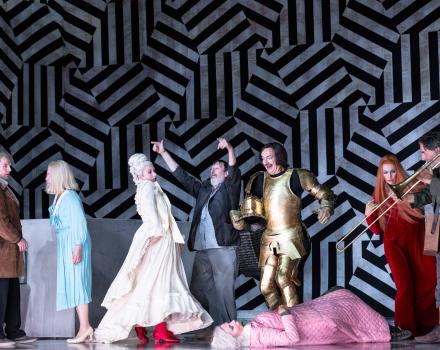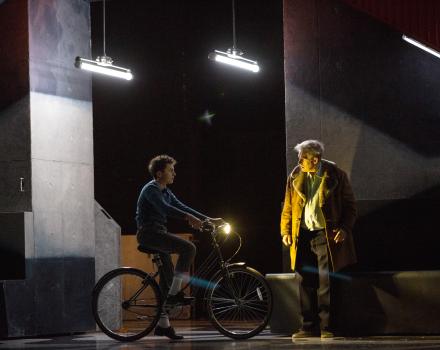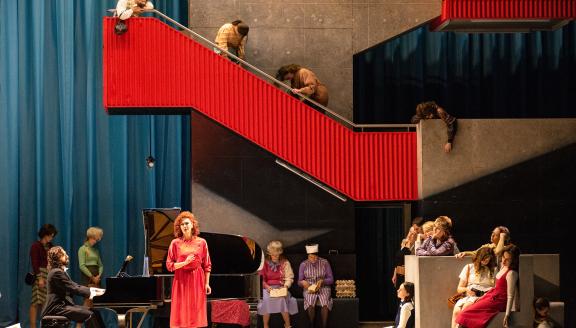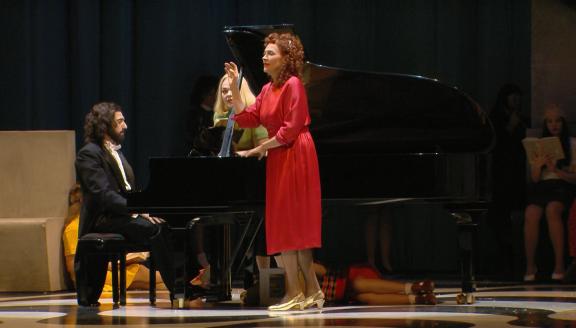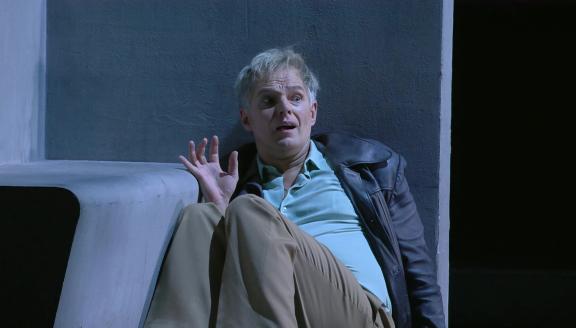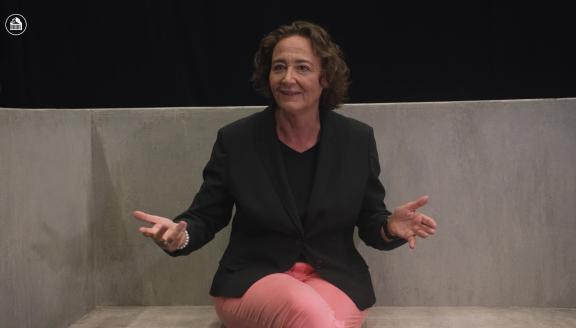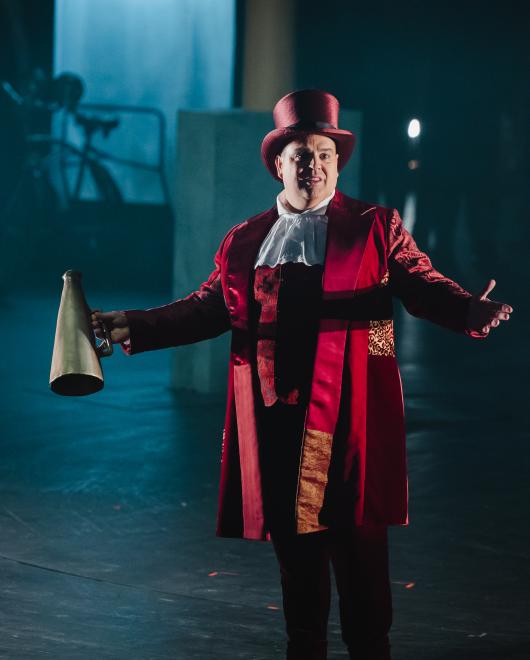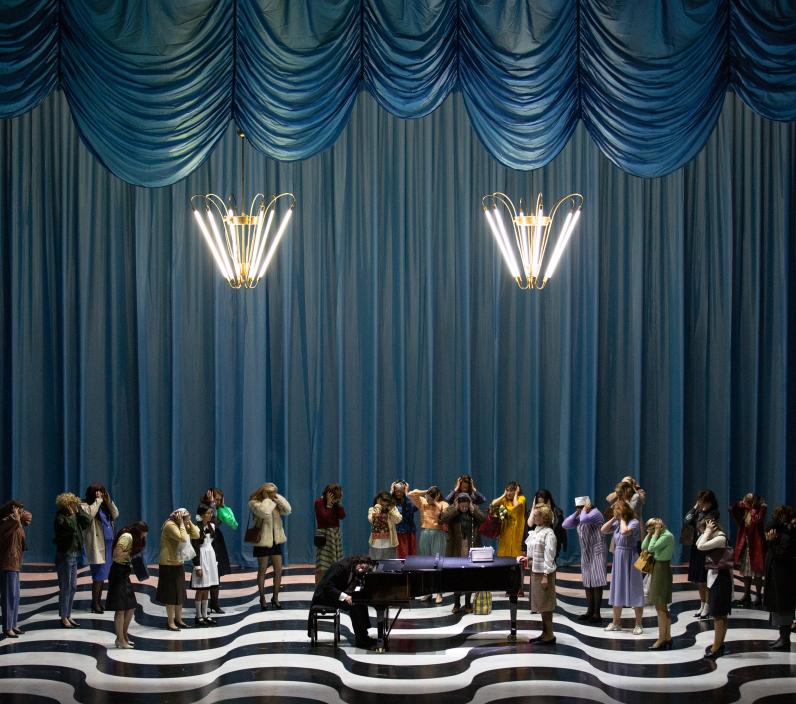
In love with an unknown lady, a young soldier discovers that her grandmother holds a secret to win at cards. Although his beloved shares his feelings, happiness slips out of reach when his obsession with the powerful secret drives him to madness.
Set in imperial Russia, Tchaikovsky’s late brooding thriller about a fanatic gambler is a tour de force of stirring melancholy, consuming passion and grand sweeping orchestration. If the opera saw the light of day thanks to his brother, the librettist Modest Tchaikovsky, Pikovaya Dama (Queen of Spades) soon became Tchaikovsky’s own personal obsession. Composed in only 44 days, he considered it a masterpiece. Do the fears and neuroses of the characters in Pikovaya Dama have a particular resonance with our age? This is what the director David Marton sets out to explore in this new production which opens the 2022-23 season in Brussels. Conductor Nathalie Stutzmann presides over an excellent cast with the full forces of La Monnaie’s Symphony Orchestra and Choruses.
Cast
Hermann | Dmitry Golovnin |
|---|---|
Count Tomsky - Zlatogor | Laurent Naouri |
Prince Yeletsky | Jacques Imbrailo |
Countess | Anne Sofie von Otter |
Lisa | Anna Nechaeva |
Polina - Milovzor | Charlotte Hellekant |
Chekalinsky | Alexander Kravets |
Surin | Mischa Schelomianski |
Chaplitsky / Master of Ceremony | Maxime Melnik |
Narumov | Justin Hopkins |
Governess | Mireille Capelle |
Masha - Prilepa | Emma Posman |
Stage pianist | Alfredo Abbati |
Chorus | Chorus, Children and Youth Choirs of La Monnaie |
Orchestra | Symphony Orchestra of La Monnaie |
| ... | |
Music | Pyotr Tchaikovsky |
|---|---|
Text | Modest Tchaikovsky and the composer after the novel by Aleksandr Pushkin |
Conductor | Nathalie Stutzmann |
Director | David Marton |
Set | Christian Friedländer |
Costumes | Pola Kardum |
Lighting | Henning Streck |
Dramaturg | Lucien Strauch |
Chorus Master | Christoph Heil |
Children and Youth Choir Conductor | Benoît Giaux |
Video Director | Anaïs Spiro |
| ... | |
Videos
STORY
Act I
It’s a rare moment of fine weather in Saint-Petersburg. Citizens are out strolling. Herman’s acquaintances discuss his bizarre behaviour: every night he comes to the gaming house, but instead of gambling he watches others play. Herman opens up to Tomsky about his secret love for a girl he doesn’t know. Prince Yeletsky receives congratulations on his engagement. The Countess enters, accompanied by her granddaughter Liza. Yeletsky presents Liza to everyone as his bride. Herman can’t control the sudden anxiety: this is his unknown beloved. The eyes of all those present at the unfolding drama meet. They realize that there is a mysterious connection between them all. A sinister premonition embraces each person. The Countess leaves. Tomsky tells the story of how, years ago, she learned from Count St. Germain a secret formula of the three cards that guarantee to win. Herman’s friends make jokes suggesting he takes the crone as his lover and charms out the secret of the three cards. The storm begins. Herman is left alone amidst the raging weather. He swears a solemn oath to win over Liza.
Liza spends the eve of the wedding with her girlfriends. Polina sings a sad song followed by a merry dance. The governess sent by the Countess scolds the exhilarated girls and sees the guests out. Left all alone, she finds herself thinking of the mysterious stranger. Suddenly Herman enters the room. Liza is torn between the sense of duty and the passion growing in her. Like a vision of death, the Countess appears. When she leaves, Liza declares her love to Herman.
Act II
Liza meets Herman at the ball. She gives him a key to the secret door that leads to her room through the Countess’s bedroom. The desire to learn the formula of the three cards possesses Herman’s mind entirely.
Herman enters the Countess’s bedroom and hides in there. Having returned from the ball, the mistress of the house longs for the past and reminisces about her youth. Herman comes out of his shelter and pleads the Countess to reveal her secret to him. Hearing no answer, he then threatens her. Suddenly Herman realizes the Countess is dead. At that moment Liza enters and becomes a witness to the terrifying denouement.
Act III
Herman reads the letter from Liza. She believes him to be innocent and is waiting for him. In the state of delirium, he remembers the Countess’s funeral. He imagines she winked at him from the coffin. He sees the ghost of the Countess and hears the names of the three cards: three, seven, ace.
Liza is waiting for Herman on the embankment. Realizing he is to blame for the Countess’s death, in despair, she throws herself into the water.
Herman comes to the gaming house and wins two times in a row. In the third game, he is opposed by Prince Yeletsky. Herman wants to bet everything on the ace in his hand, but the winning card turns out to be the queen of spades. Having lost all the money, he ends his own life.
Insights
Anne Sofie von Otter on her first Countess
In a long career at the upper echelons of the opera world, Anne Sofie von Otter is only now giving her first performance as the Countess in The Queen of Spades at La Monnaie. Tchaikovsky might have written the role for such a great mezzo voice and Jasper Croonen meets the Swedish grande dame.
Anne Sofie von Otter: ‘I would never have wanted to try it before now. Despite her relatively small role in the story, the Countess is the key character in this work. And you can perform her in so many different way.
She is often portrayed as a moody, petulant woman, but at the same time, she can also be played in a very fragile or overly comical way. Dmitry Golovnin told me that he had seen a recording of a theatre version in which she was played as a real bitch! I think it has to do with the fact that Tchaikovsky gives her very little backstory. In Pushkin’s case, you learn a little more about her, but there, too, it’s primarily second-hand. In both cases, it is mainly the other characters who are talking about her. This gives her a kind of mysterious, almost legendary allure and allows both the director David Marton and me, as the vocalist, the freedom to portray the character as we see fit.’
In the opera, your character remembers her performances ‘as if it were yesterday’. Is there a moment from your career that has stayed with you so vividly?
‘Both my first Cherubino in Covent Garden and the Mozart cycle with Gardiner are still vivid in my mind. But the absolute highlight is Der Rosenkavalier with Carlos Kleiber, in 1994 at the Staatsoper in Vienna. It was as if all the pieces of the puzzle fell instantly into place: the orchestra was in top form, and Kleiber too, of course. If I want to be remembered for anything, let it be that production.’
What is your first memory of Tchaikovsky’s music?
‘He used to be my favourite composer. His music means a lot to me. As a child, I always wanted to become a ballerina, so my parents took me to classical ballet performances from an early age. I think I was eight when I first heard pieces like Swan Lake or Sleeping Beauty. I was completely overwhelmed by Tchaikovsky’s romantic, passionate musical world.’
When the Countess talks about the glory of the past, does that make you think about the finiteness of a singer’s career?
‘I’ve especially noticed that, at this point in my career, I have a lot less interesting roles that are not really my cup of tea. This is something that I regret, of course, but I consider it my craft as a singer to make a character sound as it should. I don’t have a big philosophy about that and I try not to overthink it, but certain characters just simply have a certain tone you have to respect.
Perhaps the best counterexample I can give is when I sing a recital. There, the audience doesn’t really expect a role; mostly, they want an eloquent voice. I may have evolved, but I will always strive for that freshness and beauty that belongs to the genre of a lied evening. In that respect, an opera role as the Countess is, of course, a blessing. I can give everything free rein and my voice can sound a bit older in that instance!’
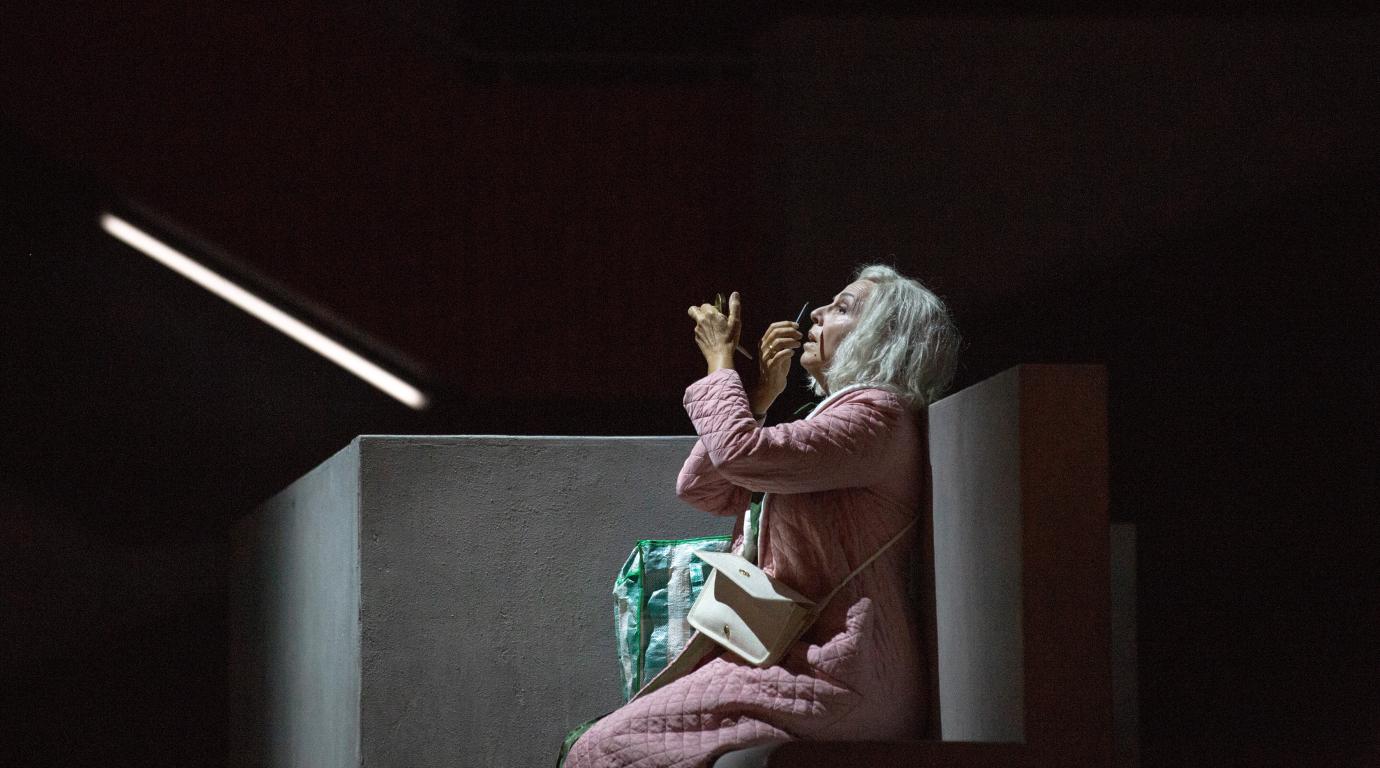
GALLERY
